WASHINGTON, DC
May 15, 2011
STRANGER: Patrick Walker
LOCATION: Acqua Al 2, 212 7th Street SE, Washington, DC
THEME: Dinner with a pastor
They say never talk politics or religion with a stranger.
I have no idea who “they” might be, so I chose to ignore that anonymous advice as I sat down to Sunday dinner with Patrick Walker, a pastor at the New Macedonia Baptist Church in Southeast Washington, DC.
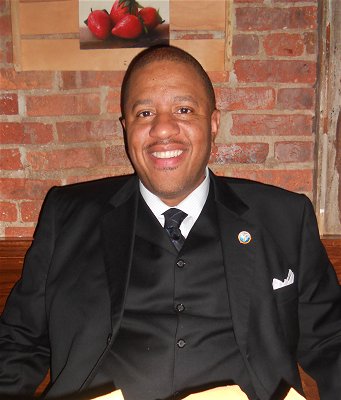
For his religious work, Patrick travels across the country and the globe spreading the word of God, including a recent trip doing relief work in Haiti. He’s also heavily involved in local community issues, garnering a lot of publicity in the last year as a prominent figure leading the fight against a city law that legalized gay marriage in Washington, a battle that blended religion with politics.
“Interesting” is how Patrick described being in the dual role of leader of a black baptist community largely opposed to gay marriage, and attacked as a bigot by campaigners for gay marriage. But he was at pains during dinner not to let that fight define his pastoral position, although it’s fair to say he became the most animated while laying out his arguments on the issue.
We met on a blustery Sunday evening in Eastern Market, a neighborhood with some excellent restaurants including the French place Montmartre that I’ve previously reviewed.
Dinner was at Acqua Al 2, an Italian restaurant just a short walk from Montmartre. I was early so I took a seat at the small hardwood bar and sipped at some water. Yes, this on-and-off lush managed to restrain himself from ordering any alcohol with dinner.
The extra time gave me a chance to take in the place. It’s definitely on the cozy side, with tables tightly packed together. That probably helps the owners cram as many diners in as possible. The fact there wasn’t a single empty table on a Sunday evening is testament to how popular the restaurant appears to be, a buzz in the air as the numerous waiters constantly flit back and forth.

Soon enough Patrick arrived, looming over me. The man is tall. He gave me a strong handshake and we walked to our table, located just opposite the kitchen so we could see all the action. Well, Patrick could see it, my back was turned to it, so I just heard the commotion behind me.
Although the restaurant is busy, the noise isn’t unbearable and instead gives the place a certain energy. Hearing Patrick wasn’t a problem, and so I set to finding out about him, after a brief bit of banter about a trip he’d taken to my home country of England. He’s quick to joke and laugh, and throughout dinner he would flash a broad smile that I’m sure his parishioners often get to see.
He’s a local, born and raised in DC. In his childhood he was a regular churchgoer, but he’s the only member of his family’s most recent generation to find a profession in religion. “I had a great grandfather who was an itinerant preacher in South Carolina, I used to hear stories about him but that was the only family member” who found work in faith, he said.
After graduating high school in 1982, Patrick’s mother gave him two options: go to college or go to military service. He chose the military. “The finances really weren’t there to go to school full time, we couldn’t afford it, so I took that option and it was a good experience for me and I’m grateful.”
Patrick was in Kentucky for the entirety of his service, which he described as a “wonderful experience” that allowed him to save up a good chunk of change. But it just wasn’t for him. So after three years in the military, he left in the late 1980s and returned to DC.
For a little while Patrick worked in the federal government at the U.S. Bureau of Engraving and Printing. But he couldn’t escape the idea that his destiny was with the church.
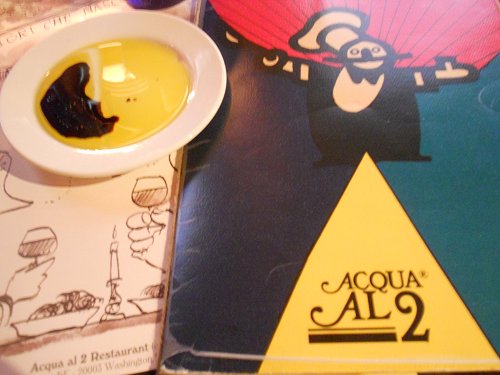
He’d had a feeling throughout his life that he wanted to be a pastor, which only grew after he graduated school and went into service. “As you grow, I think you have sense and an urgency of this is what you were called to do. Some recognize it early it life as I did, others it takes a little longer. From a very young age I just knew that this is what I wanted to do.”
So was there quite literally a hallelujah moment when Patrick knew for sure he wanted to be a pastor? “I would say that it’s probably a collection of moments,” he said, adding that no other work he’s done to date has given him fulfillment anywhere close to ministering.
Settling on the calling brought him an “abiding peace” and a realization that he now had to start planning for how to develop a career in the clergy. “Was I nervous? Yes. Scared? Yes. But I had a settled peace in doing whatever I had to do to begin this walk, this journey.”
Patrick’s family — his wife (they met at church), 17-year-old daughter and 11-year-old son — were “surprised” at his calling. His mother also “struggled with it initially, asking are you sure this is what you want to do, those kind of things. But then overall she was very supportive. My mom has since passed, but both of my brothers are in my ministry and they very much respect it.”
The high school I went to back in England (shout out for Hymers College!) is a Church of England private school where we had to sing hymns and read prayers at assembly every morning. We also had a religious education teacher that looked like Australian singer/artist Rolf Harris, and he gave me detention one time for defacing my own textbook, and I’m still bitter about that. That unfortunately is the extent of my religious schooling, so I had to keep apologizing throughout dinner as I asked Patrick what I’m sure came across as rather poorly informed questions.
“I didn’t have a degree or pastoral experience”
Example: I was clueless about how one gets a job as a pastor. Do they go to Bible school?
Apparently that’s one option, after which the pastor-in-development goes to seminary. Patrick’s currently finishing up an undergraduate program in theology at his seminary. The other option is what he described as “on-the-job training” by preaching at churches.
“When one feels their life calling, the normal route would be to acknowledge it, to share it with your current pastor or minister,” he said. Although Patrick’s at school now, his first pastoral position was age 26 at a small church in Martinsburg, West Virginia, that had about 15 members, a number “which is not unusual for a young pastor to start off with.” He added, “I didn’t have a degree or pastoral experience,” but even so his confident approach to spreading the word of God helped grow the congregation to more than 600 families by the time he decided it was time to move on.
After his stint in the Mountain State it was back to DC and his childhood church, the New Macedonia Baptist Church in Southeast Washington. “I was in a very unique situation here coming back to Washington,” Patrick said, because he was taken under the wing of the church’s older minister Robert Walls. After serving the church for more than 42 years, Walls “wanted someone to come and work alongside of him to prepare for retirement. So I was his handpicked successor. I didn’t have to candidate or go through the application process.”
Patrick’s busy every Sunday doing three morning services, though his job is a week-long occupation because he has to handle other events such as weddings and funerals, acting as the church’s representative at functions in town and elsewhere, all the while balancing his work with his ongoing seminary studies. A busy life that he said “is not really 9 to 5.”
Most Mondays he also takes part in a meeting of roughly 200 baptist ministers in the Washington metropolitan area. The group provides training and “fellowship, camaraderie, bonding,” but also acts as a singular voice in spreading the church’s message “to combat social ills,” he said.
I could sense the topic was veering into the gay marriage debate, but I didn’t want to make the dinner all about one issue. I wanted to find out Patrick the pastor, not Patrick the anti-gay marriage campaigner. There would be time for that later. Aiding my stalling tactics, our upbeat waitress arrived with my starter. Patrick opted to stick with just a main course.
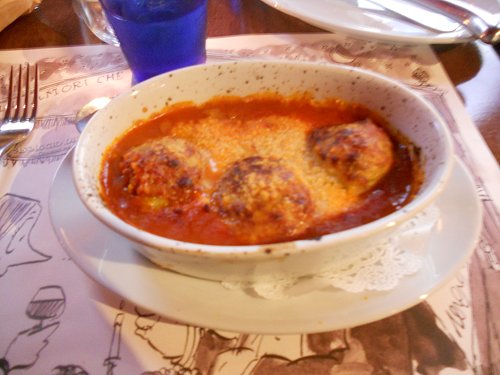
My appetizer was the “Strozzapreti al Pomodoro.” Now, my eldest brother speaks Italian but I haven’t got a clue what those three words mean, so I’m just going to use the restaurant’s menu to tell you it was fresh ricotta cheese and spinach balls hand-rolled and baked in a house tomato sauce, topped with Parmesan cheese. A huge serving for just $13.
It was outstanding. The tomato sauce was rich and with a little bit of a kick to it, and the ricotta and spinach were both fresh and flavorful, making for a great dish. The hog that I am, I devoured the whole thing, while questioning Patrick between mouthfuls of food.
As I dug in to my starter and guaranteed another 30 minutes on the gym treadmill later that night, Patrick told me that his job also involves a lot of administrative work. “I run a non-profit. I have to manage a staff, I have to make a budget, I don’t receive any federal grant funds, I have to raise my donations through my members, almost like any other person who would run any other non-profit.”
Patrick also has to plan for out-of-town and international trips to preach and do volunteer work, including a fairly recent trip to earthquake-ravaged Haiti. “I had been to Haiti before the earthquake to minister there a few years ago. To see that kind of devastation was just beyond words. To see the capital in ruins, to see the presidential palace and places I had been and seen and taken pictures of — and have before and after pictures of them — was just mind-boggling. It was a very sobering experience,” he said.
Mission work has also taken him to Africa, and there’s another trip to Haiti slated for later this year. Although Patrick believes that the church is doing good work tending to the poorest people in those countries, “it’s also very frustrating because you know whatever you do is just a drop in the bucket.”
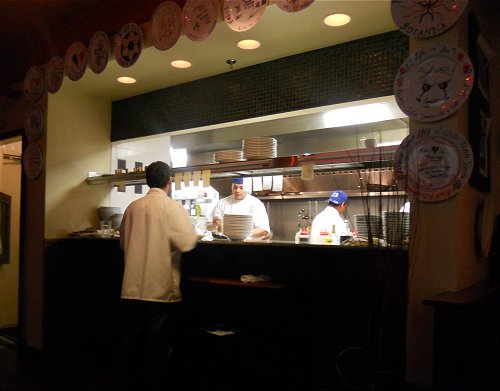
He said it reminds him of the tale of thousands of swordfish washed up on a beach, struggling to breathe out of water. A man walks down and takes one swordfish and throws it back into the water, then another. Some sourpuss told the man he’d never make a difference given how many thousands of fish were still on the beach, but the man responded that in the life of the fish he threw back into the water he had made a difference.
“You’ve got to have that kind of approach, if you’re able to change the life of one family, to provide some stability some hope, often times you can parlay that into getting them out of poverty,” Patrick said. That approach doesn’t just apply to overseas work, however, because it blends in with his work within his congregation — another place he sees as a real opportunity to change lives.
Some of Patrick’s “good days” at the church include being able to use his position in the community to make a phone call or two and save a mother with two young children from losing their home, or helping an ex-offender released from prison get a job.
Another benefit of being a pastor is “I get to celebrate lot of happy times with families: the weddings and college and high school graduations, retirements, blessing of babies. I’m always invited as a guest because people want their spiritual leader to come and share in those moments. I get to share my best days in some of the happiest moments of families lives,” he said.
Unfortunately the closeness with those families also leads to some of lowest moments, including when members of the congregation die. Even after the funeral service for a loved one is over “I still have to be with that family for the grieving process,” Patrick said.
“I’m expected to be the voice of my community”
As a leader of the New Macedonia Baptist Church he also has to take on sometimes difficult positions representing his congregation in fights both large and small — a role that he said is an absolutely natural fit for a baptist and has its roots in the Bible.
“Look at the Old Testament and see where the prophets spoke truth to power, to the kings for not being righteous to the people, I don’t think it’s unusual. The prophets speaking to political leaders is not unusual, and not far removed from the Bible,” Patrick said. For a historical example he cited Martin Luther King, Jr. who “was a baptist preacher and very involved with social change, social justice, those changes come through the political process, public policy,” he said.
“It’s expected of you to be the voice of your community on church on issues of concern,” Patrick said of being a pastor. And so it is that he’s found himself leading the fight against a new gas station in the neighborhood, due in part to concerns about the impact on the local environment and questions about the company that owned the planned station.
It’s also a role that thrust him into the center of the debate over DC’s gay marriage law. In December 2009 then-Mayor Adrian Fenty signed a law passed by the city council that allowed gay marriages in the District. Critics of the bill lamented the fact that the city’s residents were never given a referendum for a thumbs-up or thumbs-down to the legislation, and filed a lawsuit over it. The Supreme Court eventually declined to hear the case in January, ending the litigation and allowing the city’s law to stand.
Two of the most prominent figures critical of the bill were Patrick and Bishop Harry R. Jackson, Jr., of Hope Christian Church in Beltsville, Maryland.
This is when my concern that the rest of dinner would became all about the gay marriage debate flared up again, only to once again be temporarily quelled by the interruption of our waitress bringing our main courses.
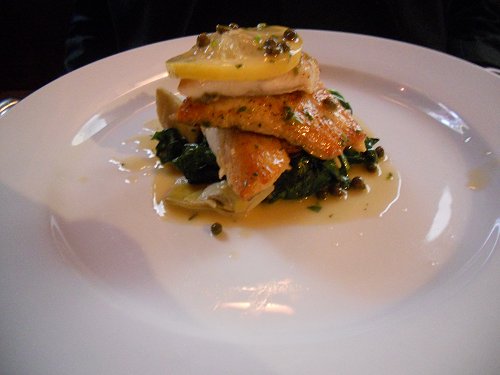
Patrick went for the $26 fish special of branzino, a seabass from Northern Italy. Edward R. Murrow would never forgive my sloppy journalism, but I forgot to make a note of what was in the special and its one-off spot on the menu means that I can’t track down those details. Still, Patrick said he greatly enjoyed his food and he polished off the plate.

I went for the $16 “Petto di Pollo alla Griglia.” Yay, more Italian words! It was a pretty simple dish of grilled chicken breast on a bed of arugula, served with cherry tomatoes. The chicken was perfectly cooked, but the arugula was overwhelming.
A brief scan of the menu showed a bunch of dishes that all feature arugula, which makes me think of several conclusions. Perhaps the owners also run a lucrative arugula farm? Or maybe they were conned by a traveling arugula salesman who made them buy bags full of it, and now they’re stuck trying to find recipes that rely on arugula? Either way, too much of the green stuff.
The main course wasn’t bad, but coming after the delicious starter it was a bit of a letdown, and I can pinpoint the blame almost squarely on the mound of salad green on my plate.
As I used my fork to stab away at the leafy explosion on my plate, I realized it was time to really violate the no-politics-with-strangers rule. There was a brief lull in the conversation as Patrick had walked me through his biographical sketch. The conversation was naturally veering toward the gay marriage debate, and my best attempts to make the interview more about Patrick the person rather than Patrick the anti-same-sex marriage campaigner were running out of steam.
So it was that between bites of arugula I told Patrick that reading about the gay marriage fight in the news is where I’d first seen his name. I broached the topic by first asking him how the battle had affected him. As he ate his seafood dish, Patrick told me that the campaign against same-sex marriage “was a real interesting time for my family.”
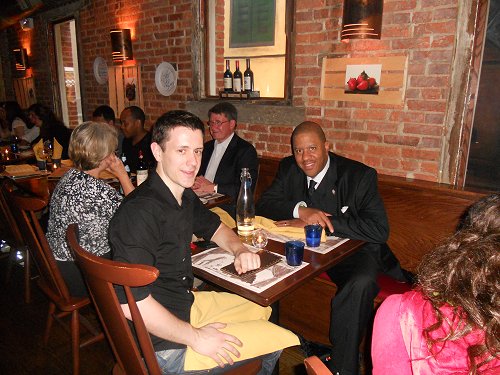
Patrick’s pretty open about people tracking him down. His name’s on his church’s website, he has a Twitter account, and you can find his email address easily online. That accessibility means that people who thought he was wrong on the issue were able to track him down, and apparently some of the messages he received during the legislative fight were, well, a tad on the rude side.
It seemed Patrick took the insults somewhat personally, saying that for some, his battle against gay marriage in the District became the defining aspect of his life and “it’s like they don’t care” that he worked on President Obama’s 2008 election campaign. “I was with a lot of people whose orientation I didn’t know and I didn’t care. That was a personal private thing and it didn’t make any difference.”
Gay marriage in the District is a personal thing for Patrick. “This legislation impacts my church and my livelihood because it tells me I can’t do certain things any longer to the general public. The legislation restricts me from opening up to the general public unless I’m also open to allowing same-sex marriage.”
Of gay marriage supporters, he said, “You have the freedom the right to do whatever you believe but there’s a line in terms of respect for what I believe and practice. I respect the person’s right but what I preach teach and practice in my congregation is my religion and it is personal.”
It’s also political. Patrick described the District — which only has a Delegate to Congress, no senators, and minimal voting rights — as “the most disenfranchised city in the country, we don’t have a right to vote.” In the gay marriage debate, he saw hypocrisy, saying that there are people in the District who say that a lack of citizen voting rights “is wrong when it comes to the budget but it’s okay when it comes to the most important legislation that impacts the family.”
“It’s a challenging job, but it’s an exciting one”
Although the battle appears to be over in the District given the loss in courts and in the legislative process for opponents of gay marriage, Patrick says the real war or “the last stand” is whether the federal government will ultimately recognize same-sex weddings.
If a federal same-sex marriage law is enacted, “I think everything else is like a domino. I can’t imagine anything that’s left. People joke about this all the time and dismiss what I say about polygamy but I think polygamy will be so easy to pass.” If gay marriage passes, “How can you argue against someone who for religious beliefs and so on who practices polygamy? It’s going to be very, very hard to argue that, in my opinion, so I think that’s just kind of the domino effect,” he said.
Patrick interrupted his own thoughts to state his belief that homosexuality is “your choice, it’s your lifestyle. If you spend your entire life with a person — that’s none of my business, that’s not the state’s business. You ought to able to choose whoever you want.”
He said he has no disdain or hatred for gay people, “especially when I have members of my congregation that are gay and struggle with this lifestyle.”
But he says marriage as defined as between a man and a woman is an “institution” that he’s fighting to protect. Based on our conversation, it’s still a huge topic for Patrick and one that clearly concerns him. But his position as a community leader fighting same-sex marriage legislation is one he feels a duty to perform as a prophet speaking to power.
Patrick said the work of a pastor has often been “interesting” — a word he used repeatedly during dinner to describe his experiences.
I was glad we saved the gay marriage discussion till the end of the meal. While it dominated the last 20 minutes of the tape recording of the interview, the first hour was filled with what hopefully came through in the first two-thirds of this article: the life of an interesting man who’s clearly found his calling and revels in all aspects of it.
Even with the difficult aspects of being a pastor, it’s still something Patrick said that he enjoys. “It’s a challenging job, but it’s an exciting one and I love what I do.”
qdeee3